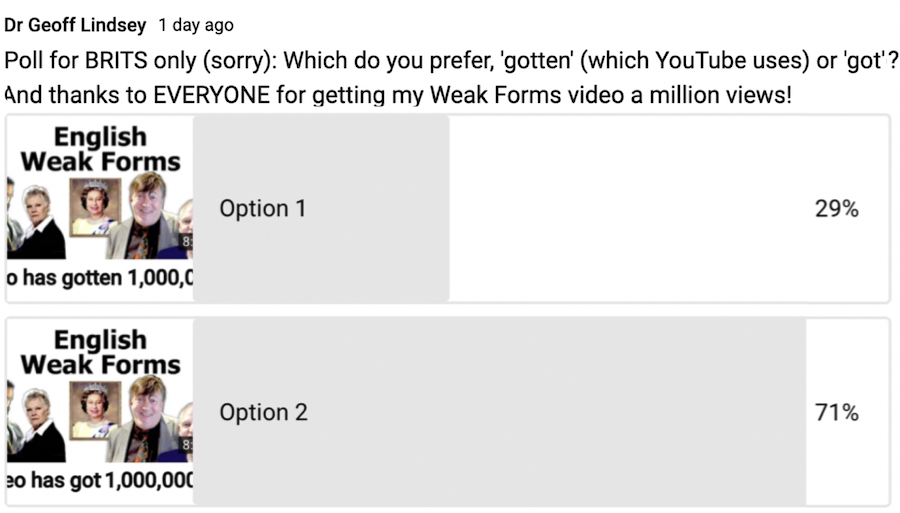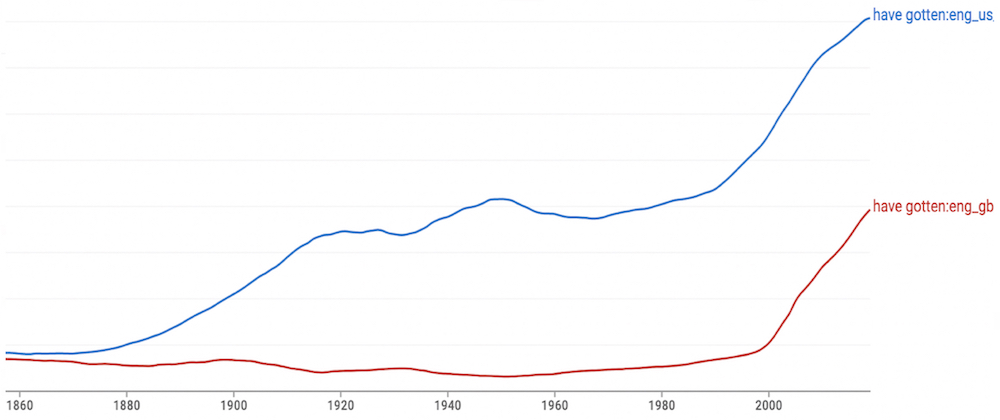Have you gotten gotten?
 I’m delighted that my video on Weak Forms recently passed one million views. As YouTube informed me: This video has gotten 1,000,000 views.
I’m delighted that my video on Weak Forms recently passed one million views. As YouTube informed me: This video has gotten 1,000,000 views.
Now that isn’t a sentence I myself would ever say or write, because my British dialect doesn’t use the word gotten. For me, the past participle of get is got, so I would have said This video has got one million views.
But in recent years the word gotten has been noted increasingly in the speech of Brits. I posted a poll in my channel’s community tab, asking my British viewers which of these two forms they prefer. By now the poll has got/gotten over two thousand votes: 71% prefer got, 29% gotten.

A number of commenters had objections to the poll. Several – chiefly Americans, I think – pointed out that has gotten and has got mean two different things:
Your video has gotten one million views = Your video has received one million views
Your video has got one million views = Your video has one million views
But the poll was aimed at Brits, many of whom, like me, haven’t got gotten at all. For people like me, has got is ambiguous, conveying both of those meanings. Incidentally, receive is more formal in tone than get, and in the relatively informal world of YouTube, I would have opted for the ambiguous got over the unambiguous received. On the other hand, for those who do use gotten, it can sound plain wrong to use got with the meaning ‘received’, e.g. I’ve just got this email from a friend.
We can certainly quibble about the poll’s methodology, but it confirmed what I expected, that the number of Brits who now happily use the word gotten is quite substantial.
It seems to be still a minority thing. Indeed, some Brits expressed bemusement at the poll, on the grounds that we simply don’t use the word here. But examples aren’t hard to find, from young and not so young speakers:
Many places have already gotten much warmer than that
She would henceforth need to learn to rein in a tendency that had clearly gotten out of hand
Online you’ll see quite a few documentaries who’ve gotten a tour round there
Over the years I have gotten pretty good I think at working from home
I know the US has gotten a lot of bad press recently
So why have humans gotten so much taller?
How many of you guys have ever gotten home from like a really stressful day?
I’ve never really gotten the whole art gallery thing
It’s gotten pretty bad these past few months
(I’ve) gotten a ton of really sweet letters
I’d gotten into a relationship with someone who had an addiction problem
He’d gotten more out of the FBI than they’d gotten out of him
Of course get is a fascinatingly (or infuriatingly) versatile verb. Any dictionary will list numerous meanings and usages, including a number of idiomatic ones. Just consider:
I like getting presents.
Please get my bag.
I’m getting tired.
I got promoted.
I got up, I got out, I got in.
I got round it.
I got it back.
I’ve got to go.
I didn’t get the joke.
The police got the thief.
I’m getting mad.
It’s getting me mad.
Could you get that call?
Let’s get moving.
I got to like him in the end.
I can’t get it to start.
Several British commenters on my poll suggested that they might use gotten for some of these meanings, but not for others. So a given speaker might say:
I’ve got ten messages this morning alone (‘received’)
BUT It’s just gotten warmer (‘become’)
But as we heard in the clips above, it’s possible to find Brits using gotten with a wide variety of meanings.
So where does this gotten come from? It certainly isn’t an American invention. It’s an old form used occasionally by Shakespeare:
You told not how Henry the Sixth hath lost
All that which Henry Fifth had gotten? (Henry VI, Part III)
And here it is in the 1700s:
The queen likewise ordered the thinnest silks that could be gotten (Swift, Gulliver’s Travels, 1726)
As soon as you have gotten an account of them exactly, you will be pleased to send it me (Richardson, Pamela, 1740)
Mrs Wilkins having therefore, by accident, gotten a true scent of the above story (Fielding, Tom Jones, 1749)
But then it seems to have fallen out of use, at least in standard English grammar. I checked the amazing Hyper-Concordance of the Victorian Literary Studies Archive and (unless I’m mistaken) gotten is entirely absent from these works:
Jane Austen: Emma; Pride and Prejudice; Sense and Sensibility
Charles Dickens: David Copperfield; Great Expectations; Oliver Twist
Thomas Hardy: Far from the Madding Crowd; The Mayor of Casterbridge; Tess of the d’Urbervilles
And gotten is similarly hard to find in American works of the 19th century. I couldn’t find it in any of:
Louisa May Alcott: Little Women
Nathaniel Hawthorne: The Scarlet Letter
Herman Melville: Moby-Dick
Mark Twain: The Adventures of Huckleberry Finn
Walt Whitman: Leaves of Grass
And I found it only once in the 261,864 words of Edgar Allan Poe’s short stories:
“That’s a lie!” said the metaphysician, for the wine had gotten a little into his head. (Bon-bon)
But if America didn’t invent gotten, perhaps we can say that America re-invented it. This Ngram shows it being used more and more in American publications from the late 19th century, while it remained dormant in British publications – until the internet age.

I feel sure that the internet has played a role in the recent rise of gotten among younger Brits. And I’m not just talking about the more or less conscious adoption of the linguistic behaviours of fashionable influencers, many of whom are of course American. Consider again the message from YouTube that I started this post with:![]() In various territories around the world, messages from the American internet giants like Amazon and Google are translated into Spanish, Japanese, etc. But in Britain they’re sometimes left in their original form.
In various territories around the world, messages from the American internet giants like Amazon and Google are translated into Spanish, Japanese, etc. But in Britain they’re sometimes left in their original form.
When this happens, crucially, there’s no overt marking of American-ness, as there is in American-accented speech. When Brits growing up in the internet age see a message like this one, there’s nothing to tell them that it’s from some other country: it’s just part of the fabric of life.


I ain’t got neither got nor gotten.
I only got: ain’t got.
Got it ?
Linguists have been watching this! The revival of “gotten” ca. 1900 in the US is covered by Lynne Murphy in The Prodigal Tongue, and after writing the book she saw it making a comeback in the UK too and made it her 2019 US-to-UK Word of the Year.
Also see London-based editor Tom Freeman for a nice survey of American usage manuals, which had considered “gotten” obsolete in the early 19th century, but endorsed it in the 20th, supported with ngrams. Freeman was seeing it starting to increase in the UK too, and he notes that Butterfield’s edition of Fowler had already noticed it by 2015.
(The New Yorker ruled out “gotten” in their stylebook when the magazine was founded in the 1920s, a position that was already old-fashioned in the US by then; by setting that rule in stone they’ve looked more and more peculiar to American readers, but it’s part of their brand.)
Thanks for reminding me of The Prodigal Tongue. I’m ashamed to say I missed Lynne’s 2019 Word of the Year, and Tom Freeman’s survey was also new to me — thanks again!
I’m not keen on got or gotten in this context (YT views). I prefer “…has had…” or “…has been viewed n times.”
To me as an American, ” has got” sounds informal. In careful speech/writing, I would only use has/have gotten, with the exception of using it as an emphatic “must.”
“You have GOT to be kidding!”
IMHO “have got” is never a logically-valid construction for two main reasons:
1. It’s often used in constructions such as “I’ve got you a gift”, where the past perfect tense is intended only for the verb “get” to be misconjugated in the simple past (it should say “I’ve gotten you a gift”); and
2. It’s also frequently used in constructions such as “You’ve got to see this”, where the “got” is entirely superfluous as it adds precisely zero extra meaning over “You have to see this”.
TL;DR There are no situations where “have got” should actually be used as it is either tense-mixing or tautologous.
But “got” IS the past participle of “to get” in standard British English — though of course as this post points out “gotten” is starting to gain more traction here as an alternative form. You’re being incredibly obnoxiously America-centric by declaring it must never be used.
An American-centric Briton is certainly “a novel concept”.
I’m not saying it should never be used; I’m saying that it makes no sense from the perspective of either grammar or logic.
“got” is the simple past of “get” (I got you a gift), while “gotten” is the past perfect (I have gotten you a gift).
In the same way that “I had forgot it was your birthday” is a mix of different tenses in a way that makes the intended meaning (at least on a temporal level) impossible to judge, so too is “I have got you a gift” to a logical individual like myself.
American here. I learned as a child (1960s) that “got” is the simple past of “get”, and “gotten” is the party participle. Therefore, “I got you a gift” or “I’ve gotten you a gift”, but not “I’ve got you a gift”.
In a poetry class I took in college, we learned that English has 4 levels of stress. Obviously this was more meant for decoding syllabic stress in the context of metered poetry, but for an example like “vulnerable” I would say that “vul” is a 2 or a 3 (rather than a 4 perse) and “er” “a” and “ble” are all 1s.
Something I’ve noticed recently is an increased use of “how … like” instead of “what … like” or “how …”. For example, “How does it look like?” “Here’s how that sounds like” etc.
As a millennial American, this phrase was always a clear indicator of a non-native speaker to me. However, I’m seeing more and more native young people using it. I wonder if they were exposed to enough non-native speakers using it that they never learned it was “incorrect”? Or maybe it’s just a fad? I know as a teenager my peers were responsible for the usage of the word “anyways” which always drove my mother crazy. It was very popular!
To me, got and gotten have different meanings that tell me when to use either one.
Got = have.
Gotten = have received.
For instance:
I’ve got a cold = I have a cold.
I’ve gotten a cold = I have received and now have a cold.
I’ve just got a cold = I only have a cold.
I’ve just gotten a cold = I’ve recently recieved a cold.
In old Bristolian we use “got” but not “gotten”. What sounds like gotten is the way we would say “got it” as “got’n”.
Adge Cutler used this in a song parodying Bristolian: https://www.youtube.com/watch?v=AnKjwOLiBTg
In my south eastern British accent, I use ‘hot’ for some purposes and ‘gotten’ (influenced from American television) for others.
It’s worth noting that in my accent we often use ‘got’ as a reinforcing word for ‘has’, for example: instead of simply saying “he has a bike”, it’s far more common to hear “he has got a bike”, or more common still “he’s got a bike” where ‘has’ has been shortened to ‘s. The ‘got’ in this sentence isn’t processed by me as a present perfect tense, but simply as an alternate way to express ‘has’, and therefore does not connote any notion of ‘receiving’ or ‘acquiring’. Therefore when I read the following sentence “this video has got 1,000,000 views”, I don’t parse that as “this video has ‘received’ 1,000,000 views” but rather simply as “this video ‘has’ 1,000,000 views”. Therefore, given that in my accent ‘has got’ has lost its present perfect quality, I tend to use ‘gotten’ to indicate this instead: “This video has gotten 1,000,000 views” I parse as “this video has received 1,000,000 views”.
In my mind ‘gotten’ connotes a change of state (become, acquire, receive) that ‘got’ has lost in certain contexts.
thank you for this insight
Interesting! “Gotten” always makes me think of the (socially frowned upon as “incorrect”) word “boughten”, meaning “having the property of having been bought” or “was previously bought”. We’d say it like “yeah, this is store-boughten” or “No, it’s not boughten, I made it myself”. Don’t know that there’s a connection between the words, but they sound so similar (and gotten is /not/ considered wrong) that it always stands out to me!
Повысьте эффективность своего производства с помощью наших приводных устройств! Наши инновационные устройства позволят вам значительно снизить расходы на электроэнергию,
увеличить производительность оборудования и снизить износ механизмов. Благодаря нашиему оборудованию вы сможете значительно увеличить производственные мощности и улучшить качество выпускаемой продукции – https://saumalkol.com/forum/%D1%80%D0%B0%D0%B7%D0%BD%D0%BE%D0%B5-2/10722-g%D1%80%D0%B5%D0%BE%D0%B1%D1%80%D0%B0%D0%B7%D0%BE%D0%B2%D0%B0%D1%82%D0%B5%D0%BB%D1%8C-%D1%87%D0%B0%D1%81%D1%82%D0%BE%D1%82%D1%8B-%D0%B4%D0%BB%D1%8F-%D0%B0%D1%81%D0%B8%D0%BD%D1%85%D1%80%D0%BE%D0%BD%D0%BD%D0%BE%D0%B3%D0%BE-%D0%B4%D0%B2%D0%B8%D0%B3%D0%B0%D1%82%D0%B5%D0%BB%D1%8F.html#22856 – преобразователь частоты для асинхронного двигателя